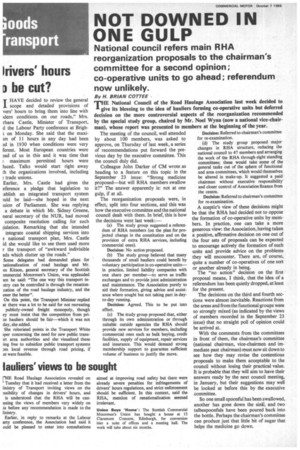NOT DOWNED IN ONE GULP
Page 22

If you've noticed an error in this article please click here to report it so we can fix it.
National council refers main RHA reorganization proposals to the chairman's committee for a second opinion; co-operative units to go ahead; referendum now unlikely.
By H. BRIAN COTTEE
TUBE National Council of the Road Haulage Association last week decided to A. give its blessing to the idea of hauliers forming co-operative units but deferred decision on the more controversial aspects of the reorganization recommended by the special study group, chaired by Mr. Noel Wynn (now a national vice-chairman), whose report was presented to members at the beginning of the year.
The meeting of the council, well attended by about 100 members, was asked to approve, on Thursday of last week, a series of recommendations put forward the previous day by the executive committee. This the council duly did.
Colleague John Darker of CM wrote as heading to a feature on this topic in the September 23 issue: "Strong medicine proposed—but will RHA members swallow it?" The answer apparently is: not at one gulp, if at all.
The reorganization proposals were, in effect, split into four sections, and this was how the executive committee and the national council dealt with them. In brief, this is how the decisions went last week:—
(a) The study group suggested a referendum of RHA members (on the plan for projected change in the constitution and on the provision of extra RHA services, including commercial ones).
Decision: No action proposed.
(b) The study group believed that many thousands of small hauliers could benefit by voluntary participation in co-operative units— in practice, limited liability companies with one share per member—to serve as traffic exchanges and to provide joint administration and maintenance. The Association purely to aid their formation, giving advice and assistance where sought but not taking part in dayto-day running.
Decision: Agreed. This to be put into effect.
(c) The Study group proposed that, either through its own administration or through suitable outside agencies the RBA should provide new services for members, including commercial ones such as bulk buying, credit facilities, supply of equipment, repair services and insurance. This would demand strong membership support to guarantee sufficient volume of business to justify the move. Decision: Referred to chairman's committee for re-examination.
(d) The study group proposed major changes in RHA structure, reducing the national council to 47 members and arranging the work of the RHA through eight standing committees; these would take some of the general tasks out of the sphere of functional and area committees, which would themselves be altered in make-up. It suggested a paid chairman without executive responsibility and closer control of Association finance from the centre.
Decision: Referred to chairman's committee for re-examination.
A sceptic's view of these decisions might be that the RHA had decided not to oppose the formation of co-operative units by members. In practice, one can take a more generous view: the Association, having taken a positive, affirmative decision on one out of the four sets of proposals can be expected to encourage actively the formation of such units and provide advice on the problems they will encounter. There are, of course, quite a number of co-operatives of one sort or another already in being.
The "no action" decision on the first proposal means, I think, that the idea of a referendum has been quietly dropped, at least for the present.
The decisions on the third and fourth sections were almost inevitable. Reactions from the areas and from the functional groups were so strongly mixed (as indicated by the views of members recorded in the September 23 issue) that no straight poll of opinion could be arrived at.
With the comments from the committees in front of them, the chairman's committee (national chairman, vice-chairmen and immediate past chairman) must now sit down to see how they may revise the contentious proposals to make them acceptable to the council without losing their practical value. It is probable that they will aim to have their answers ready by the next council meeting, in January, but their suggestions may well be looked at before this by the executive committee.
So one small spoonful has been swallowed, another has gone down the sink; and two talbespoonfuls have been poured back into the bottle. Perhaps the chairman's committee can produce just that little bit of sugar that helps the medicine go down.




















































































































